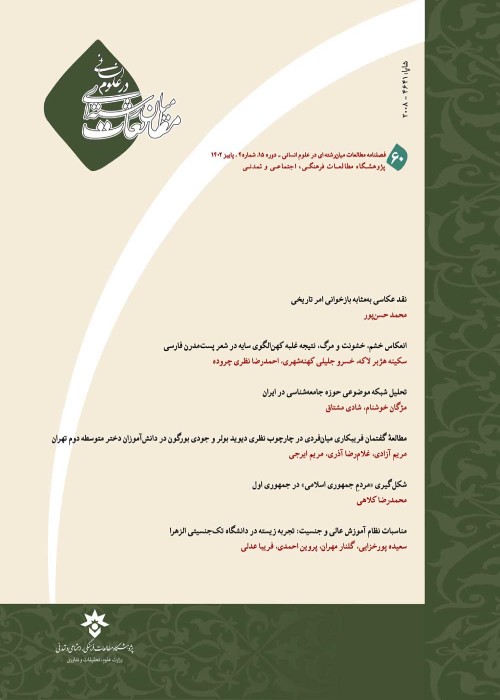The study of the interpersonal deception discourse in the theoretical framework of Buller and Burgoon among second grade high school girls in Tehran
Author(s):
Article Type:
Research/Original Article (دارای رتبه معتبر)
Abstract:
Deceptive social behavior undermines interpersonal trust and threatens healthy social interactions at various levels. Academic deceit is also among the common unethical behaviors in educational institutions, which has significantly increased with the technological development. In this article, taking an applied approach, deception in a linguistic sociological context is analyzed as an interdisciplinary subject. The analysis of phenomena from an interdisciplinary perspective allows for a better understanding and conditions for problem-solving. The study conducted in a social context within the second-grade girls' high schools in Tehran aims to achieve two main goals: 1- Identify the reasons for academic deception. 2- Examine the role of influential factors in shaping the discourse of deception and find ways to overcome it. A total of 233 students aged 15 to 17, who had experienced being in a deceptive situation, were selected. The samples had similar characteristics such as gender, occupation, educational level, and specific residential area. The research tool is a 30-item questionnaire constructed by the researcher about academic deception, validated based on the seven-point Likert scale and the Academic Deception Questionnaire by Fornes and colleagues (2011). Data analysis was performed using the SPSS statistical software. The research focuses on online classes, assignment submissions, and examinations. The research tools include two scales of academic duty-ethics and academic deception in the virtual space. The results analysis based on the Pearson correlation coefficient indicates a significant negative relationship between academic duty-ethics and academic deception. Considering this result, intervention and educational efforts to increase the ethical commitment of learners seem to be effective in reducing deceptive behaviors. These findings provide valuable information for educational stakeholders whose goal is to reduce deception in academic environments and offer important implications for the ethical education of learners.
Keywords:
Language:
Persian
Published:
Interdisciplinary Studies in the Humanities, Volume:15 Issue: 4, 2024
Pages:
91 to 113
magiran.com/p2692216
دانلود و مطالعه متن این مقاله با یکی از روشهای زیر امکان پذیر است:
اشتراک شخصی
با عضویت و پرداخت آنلاین حق اشتراک یکساله به مبلغ 1,390,000ريال میتوانید 70 عنوان مطلب دانلود کنید!
اشتراک سازمانی
به کتابخانه دانشگاه یا محل کار خود پیشنهاد کنید تا اشتراک سازمانی این پایگاه را برای دسترسی نامحدود همه کاربران به متن مطالب تهیه نمایند!
توجه!
- حق عضویت دریافتی صرف حمایت از نشریات عضو و نگهداری، تکمیل و توسعه مگیران میشود.
- پرداخت حق اشتراک و دانلود مقالات اجازه بازنشر آن در سایر رسانههای چاپی و دیجیتال را به کاربر نمیدهد.
In order to view content subscription is required
Personal subscription
Subscribe magiran.com for 70 € euros via PayPal and download 70 articles during a year.
Organization subscription
Please contact us to subscribe your university or library for unlimited access!



